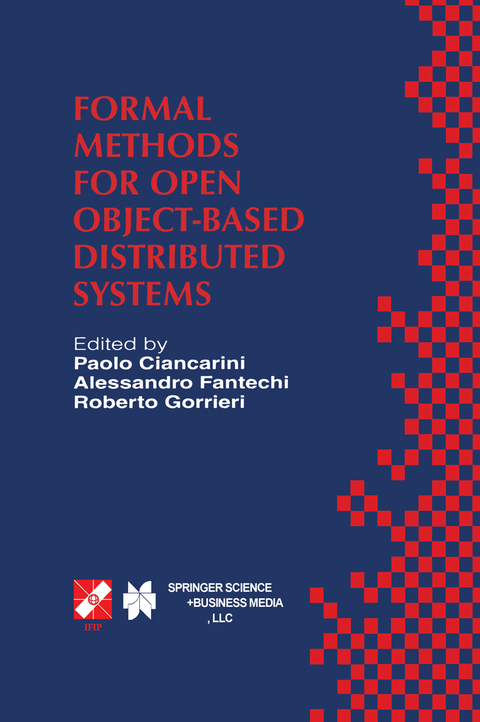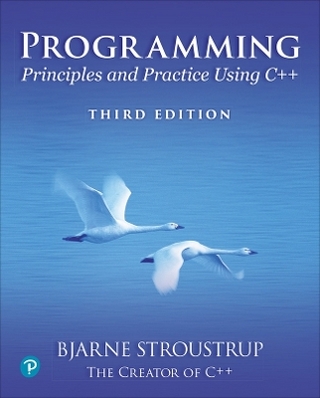
Formal Methods for Open Object-Based Distributed Systems
Springer (Verlag)
978-0-7923-8429-8 (ISBN)
Many topics are discussed, including the following important areas: object-oriented design and programming; formal specification of distributed systems; open distributed platforms; types, interfaces and behaviour; formalisation of object-oriented methods.
This volume comprises the proceedings of the International Workshop on Formal Methods for Open Object-based Distributed Systems (FMOODS), sponsored by the International Federation for Information Processing (IFIP) which was held in Florence, Italy, in February 1999.
Formal Methods for Open Object-Based Distributed Systems is suitable as a secondary text for graduate-level courses in computer science and telecommunications, and as a reference for researchers and practitioners in industry, commerce and government.
Preface. Part 1: Languages. Piccola - A Small Compositional Language; O. Nierstrasz. An Algebra of Actors; M. Gaspari, G. Zavattaro. Developing Object-Based Distributed Systems; M. Bonsangue, et al. Part 2: Semantics I. Reasoning About Histories in Object-Based Distributed Systems; F.S. de Boer. Mobile Nets; N. Busi. Observation Equivalences for the Semantics of Inheritance; C. Balzarotti, et al. Part 3: Java and Coordination. Tools for Integrating Formal Methods into the Java Software Development Process; S. Sankar. Design and Implementation of Coordination Protocols for Distributed Cooperating Objects: A General Graph-Based Technique Applied to CORBA; K. Drira, et al. Specifying Component-Based Java Applications; S. Cimato. Part 4: Object Composition and Reuse. Object Composition: A Case Study; D. Ramazani, G. v. Bochmann. Specifying Reusable Controllers for Software Components; J.M. Troya, A. Vallecillo. Composition and Interaction for Behavioural Specifications; S. Veglioni, F. Parisi-Presicce. Part 5: Telecommunications. Distributed Feature Composition: An Architecture for Telecommunication Services; P. Zave. Pattern Application vs. Inheritance in SDL; B. Gepert, et al. Engineering Telecommunication Services with SDL; R. Sinnott, M. Kolberg. SDL in Rigorous Object-Oriented Analysis; R.G. Clark, A.M.D. Moreira. Part 6: Formal Methods. A Junction Between State Based and Behavioural Specification; H. Bowman, J. Derrick. Protocol Assuring Universal Language; R. van Rein, M. Fokkinga. Specification of Dynamic Reconfiguration in the Context of Input/Output Relations; K. Stoelen.Assessing Service Properties with Regard to a Requested QoS: The Service Metric; C. Linnhoff-Popien, D. Thissen. Combining Design Methods for Service Development; M.Born, et al. Part 7: Emerging Standards. LSCs: Breathing Life Into Message Sequence Charts; W. Damm, D. Harel. Modular Reasoning for Actor Specification Diagrams; S.F. Smith, C.L. Talcott. Towards a Formal Operational Semantics of UML Statechart Diagrams; D. Latella, et al. Part 8: Semantics II. Foundations for Wide-Area Systems; L. Cardelli. Calculi for Concurrent Objects; C. Laneev. Infinite Types for Distributed Object Interfaces; E. Najm, et al. Static Safety Analysis for Non-Uniform Service Availability in Actors; J.L. Colaco, et al. A Logic for the Specification of Multi-Object Systems; J. Broersen, R. Wieringa. Part 9: Semantics III. Distributed and Concurrent Objects Based on Linear Logic; N. Kobayashi, A. Yonezawa. Composition in Multiparadigm Specification Techniques; L. Blair, G. Blair. Formal Development of Object-Based Systems in a Temporal Logic Setting; E. Canver, F.W. von Henke.
| Reihe/Serie | IFIP International Federation for Information Processing ; 10 |
|---|---|
| Zusatzinfo | XII, 436 p. |
| Verlagsort | Dordrecht |
| Sprache | englisch |
| Maße | 156 x 234 mm |
| Themenwelt | Informatik ► Software Entwicklung ► Objektorientierung |
| Mathematik / Informatik ► Informatik ► Theorie / Studium | |
| ISBN-10 | 0-7923-8429-6 / 0792384296 |
| ISBN-13 | 978-0-7923-8429-8 / 9780792384298 |
| Zustand | Neuware |
| Informationen gemäß Produktsicherheitsverordnung (GPSR) | |
| Haben Sie eine Frage zum Produkt? |
aus dem Bereich


